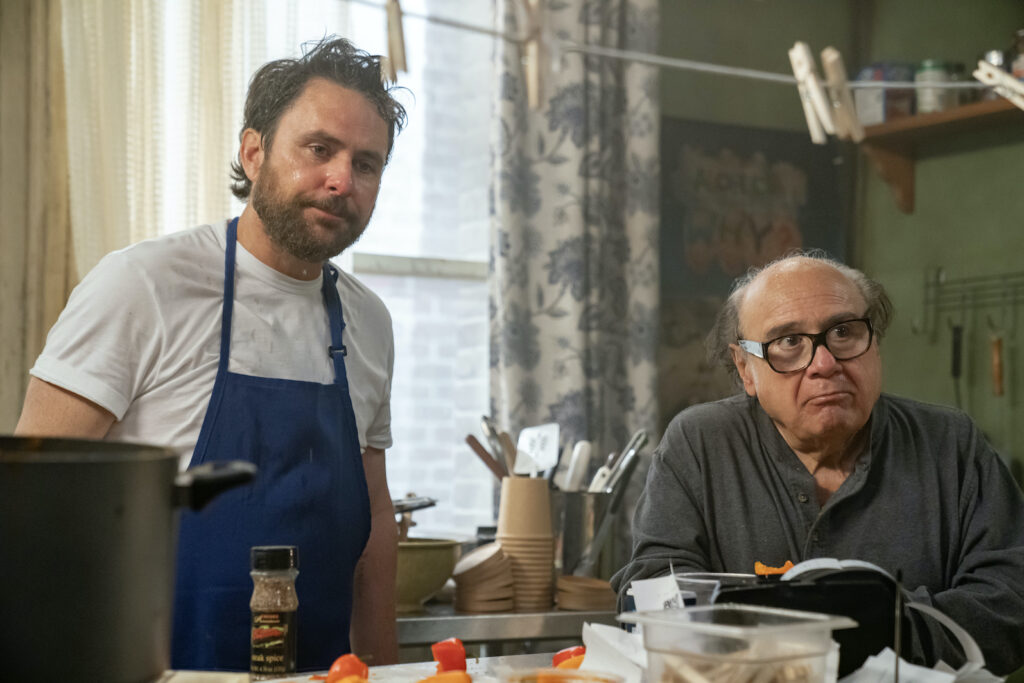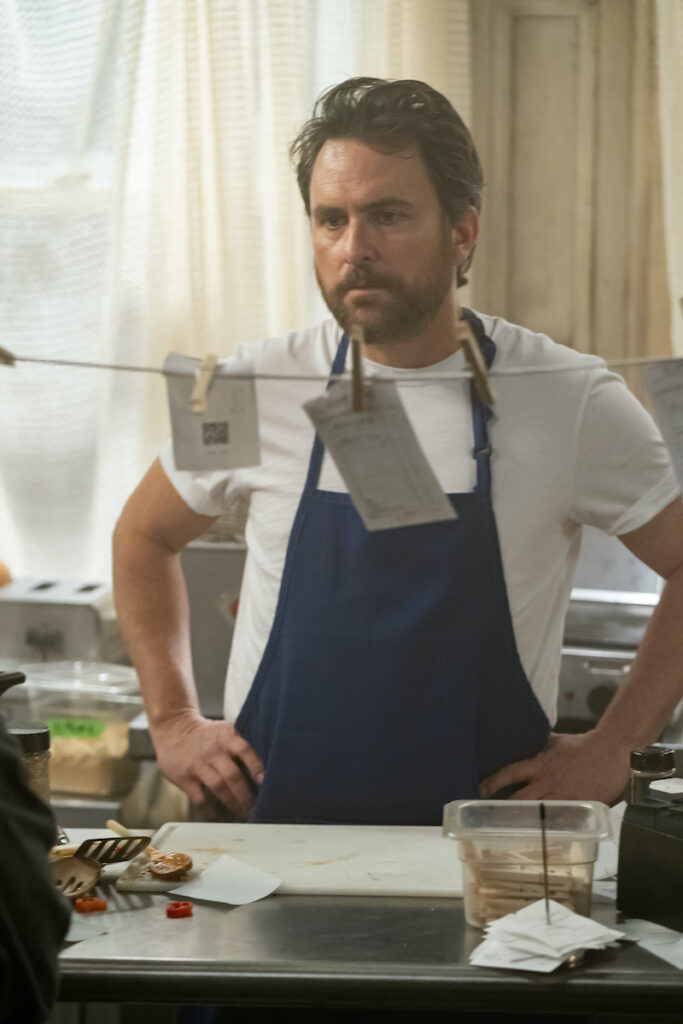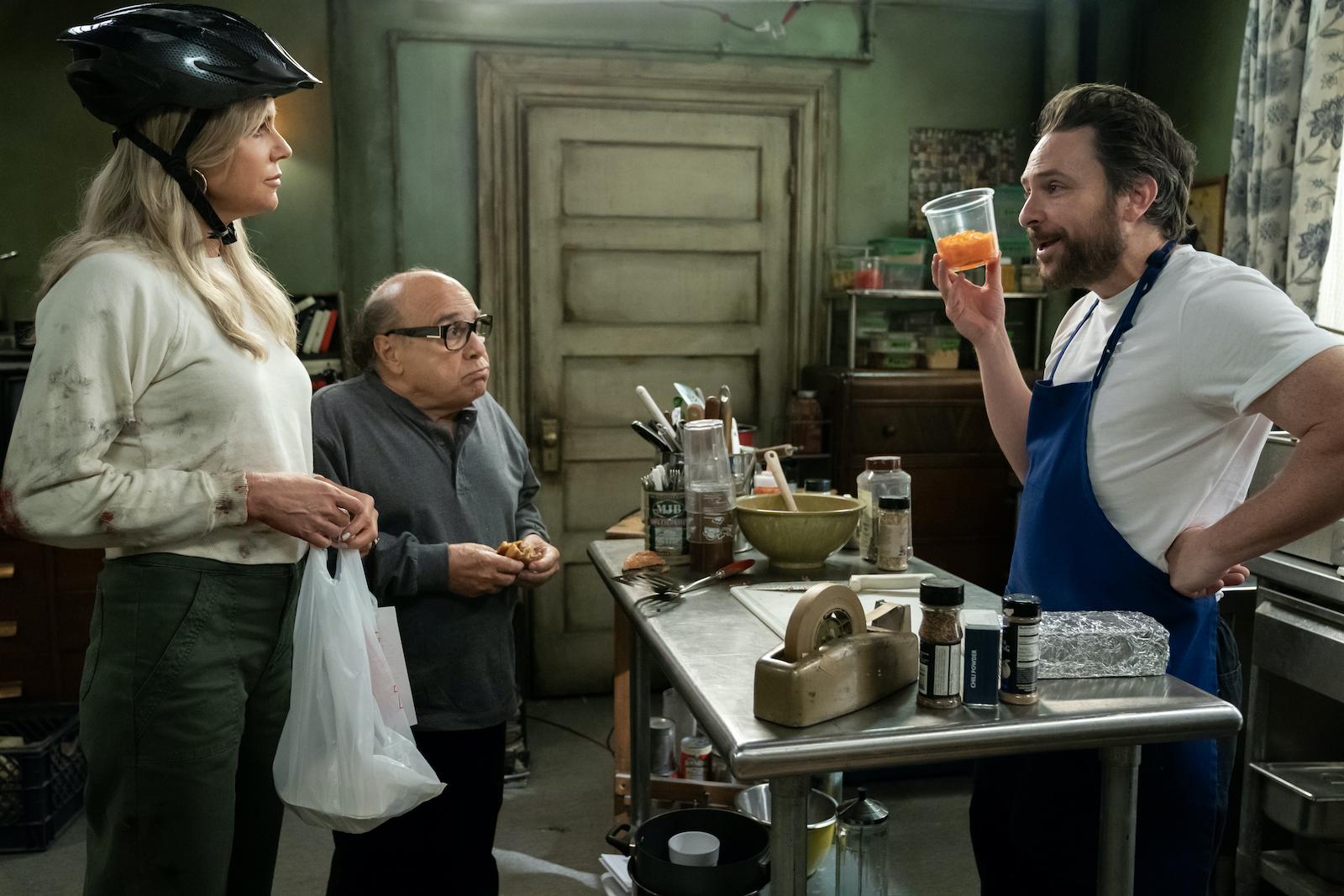In the 17th season of “It’s Always Sunny in Philadelphia,” the gang is back and more gourmet than ever. Frank fakes a coma using a hyper-realistic cake of his own body — fondant wrinkles, glossy marzipan hair, the works. Charlie opens a ghost kitchen and insists on being called “chef,” his apron knotted tight like he’s about to sear duck breast instead of, say, boil milksteak. Dee joins Postmates. Mac and Dennis attempt to franchise Paddy’s Pub into the Starbucks of dive bars.
It feels unmistakably now: a season saturated in food references, culinary hustle and edible aspiration.
After all, we live in a world where food isn’t just sustenance, it’s narrative. “The Bear” is prestige drama. The Food Network just turned 30, like a millennial clinging to relevance. And ever since Yelp put star ratings in our pockets, everyone’s been performing as a food critic, one pistachio croissant at a time. TikTok serves up step-by-step mise en place with soft jazz and fingernail clacks; mukbang creators rake in millions by eating crab legs in front of a ring light. The Cheesecake Factory’s spiral-bound novella of a menu feels less like dinner and more like a psychedelic thesis on American appetite. We don’t just eat—we curate, caption, collapse from pleasure. We cosplay as chefs. Or restaurateurs. Or simply as someone who can pronounce burrata correctly.
In this season of “It’s Always Sunny,” that performance reaches its absurd, overcooked peak — though food has always been part of the spectacle.
More often than not, the things the gang cooks, markets or consumes are totems of their most earnest, if wildly misdirected, ambitions. This comes into sharpest focus when you examine their crash-and-burn business ventures — each one a Hail Mary pass toward self-respect, status, or at least passive income. (As the writers themselves put it in this season’s teaser, “They don’t want to spend the rest of their lives working like dogs.”)
Take, for instance, Frank’s Fluids, LLC — a shell corporation initially conceived as a tax scam. Frank, sensing opportunity, expanded the operation to include tangible products, one of which was Wolf Cola. Unbeknownst to Frank (Danny DeVito), it became the official drink of Boko Haram. What followed was a full-episode damage-control tour de force, with Dee (Kaitlin Olson) and Dennis (Glenn Howerton) attempting to spin the PR nightmare while Charlie (Charlie Day) and Mac (Rob Mac) diverted their energy into a newer, more absurd venture: Fight Milk.
Fight Milk, which Charlie pitched as a way to rescue Frank’s other “legitimate” business, Atwater Capital, was billed as “the first alcoholic, dairy-based protein drink for bodyguards by bodyguards.” The recipe? Vodka, milk and raw crow eggs — a chalky, frothing elixir high in what they proudly dubbed crowtein.
We need your help to stay independent
It’s an unhinged drink for an unhinged dream, and that’s precisely the point. Here, food is rarely appetizing, but it is always expressive, a kind of edible theater for the gang’s obsessions, failures and pathological self-regard.
That dynamic is hilariously distilled in the episode “Mac & Dennis Move to the Suburbs.” After torching their rent-controlled apartment in one of their more disastrous schemes, Mac and Dennis are forced to relocate, landing in a cookie-cutter home an hour outside of Philadelphia. Over a dinner of “Mac’s Famous Mac and Cheese,” a gloopy, highlighter-yellow bowl of boxed pasta, they raise their forks in agreement: suburbia will be a breeze.
But then the mac keeps coming. Night after night, the same steaming pile appears, Mac proudly announcing it like a cafeteria worker with a head injury. The twist, of course, is that it’s not homemade, not even special. It’s boxed, bulk-bought and hoarded by the crate. When Dennis finally snaps after being served a version disturbingly flecked with meat, his spiral is operatic. The mac becomes symbolic, not just of their isolation, but of the fantasy itself: comforting on the surface, quietly grotesque beneath.

(Patrick McElhenney/FX) Charlie Day as Charlie, Danny DeVito as Frank.
If Dennis’s breakdown is about the soul-deadening repetition of meals, Frank’s appetites are something else entirely — unfiltered, unchecked, and often criminally libidinal. Food, in his hands, is a conduit for power, pleasure, chaos. Sometimes all three at once.
Rum Ham, perhaps the show’s most iconic food object, is less of a recipe and more of a deranged ritual. Born in a Season 7 trip to the Jersey Shore, the ham is soaked in bottom-shelf rum and consumed on a raft at sea — a floating bender that’s somehow both deeply American and faintly pagan. Online, fans have painstakingly recreated it, treating its absurdist origins with dead-serious reverence. The canonical recipe (which includes a handgun, a hunting knife, and a warning about “ham pirates”) reads like it was transcribed from a fever dream inside a Bass Pro Shops.
Frank’s erotic relationship with food is similarly unhinged. He puts bacon bits in his lover Artemis’s hair so they’ll rain down on him during sex. He’s had what can only be described as condiment-assisted dumpster hook-up behind a Wendy’s. In a show where food often symbolizes survival or delusion, Frank’s meals are something closer to kink.
Charlie’s, by contrast, are primal. Almost childlike. A little gross, but somehow guileless. His signature dish, “milksteak,” is exactly what it sounds like: a slab of beef boiled in milk, served “over hard” with a side of raw jelly beans. First introduced as his go-to meal in an online dating profile, milksteak has since become canon—a culinary abomination that nonetheless feels utterly sincere. Charlie doesn’t cook to impress or seduce; he cooks because his body demands sustenance, and this is what makes sense to him.
It’s not his only eccentricity. Charlie famously eats spaghetti out of a plastic sandwich bag. He snacks on dry cat food to help him sleep. He is, by any metric, deeply unhygienic — but also, endearingly devoted. He’s the one doing the janitorial work. He shows up. He believes in the power of “brown foods” to help the Eagles win.
Of all the gang, he is somehow both the most unrefined and the most pure. Someone for whom food isn’t aesthetic, symbolic or kinky. It’s just fuel, delivered with enthusiasm and the occasional side of jelly beans.

(Patrick McElhenney/FX) Charlie Day as Charlie.
One of Charlie’s most frequent culinary co-conspirators is Dee. Occasionally, they even cook together, though “cook” might be too precise a term for what they do. One of their more unforgettable food-based endeavors involved an unsettling, slow-blooming belief that they had accidentally become cannibals. It begins innocently enough: the two sit down to steaks at Paddy’s, luxuriating in the rare act of sharing a proper meal. Frank storms in and yells at them for eating the venison he hunted. And because Frank is Frank, he eventually convinces them that its actually human.
The next morning, they show up at each other’s doors with a look in their eyes — feral, anxious, twitchy. They don’t believe they ate a person. But they also don’t not believe. They’re chasing a taste. Together, they head to a butcher in Chinatown and order the most exotic meats on offer. Monkey, maybe; something sinewy and possibly illegal. They cook it all up in Charlie’s dim, sticky apartment and eat their way through it like detectives hunting for a match. Nothing satisfies. They decide, nervously, that they might need to try human meat again to know for sure. They pack a hot plate and beers and set off for the morgue. Things, of course, don’t go to plan.
And maybe that’s part of what makes their ghost kitchen in the new season feel so strangely poignant: for once, they’re trying — however misguidedly — to do something normal. Feed people. Be liked. Turn hunger into belonging.
But, of course, it also doesn’t go to plan. And of course, that’s the point. Their cravings are always misdirected, their schemes both too big and too dumb to succeed. That’s the tragedy of the gang: they’ll never find love, or stability or even a three-star Yelp review.
But they will, somehow, always find each other. And if not that, at least there’s still Rum Ham.
Read more
about this topic


